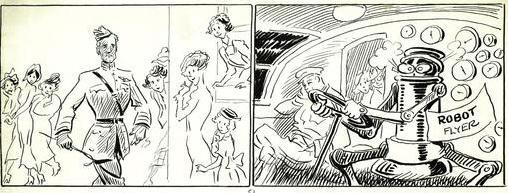John T. McCutcheon: A Cartoonist in his Prime, 1930s
McCutcheon on Technological Advancement

Published in the Chicago Tribune in 1935.
“291”--Handwritten on verso.
Pencil, ink, and wash on paper.
Title from caption-- “The Changing World”
This cartoon is one of three panels drawn on the same piece of paper and dated 1935. The 1st panel depicts a pilot walking past a group of swooning women. McCutcheon hand wrote on the verso, “The aviator has always been a romantic figure in the eyes of the girls.” In the next scene, the women are peaking through the cab at the aviator and the new “robot flyer.” McCutcheon wrote, “But how can they get excited over the new type of aviator?” According to McCutcheon, this is “The Changing World.” There were no technological advancements in 1935 pointing to the idea of robot pilots being a real thing. However, a recent change in popular culture could have led to McCutcheon’s active imagination.
The English word “robot” became common knowledge in the 1920s with the release of the Czech science fiction play R.U.R which was widely famous and translated into 30 languages by 1930.[1] Additionally in 1935 inspiration was drawn from R.U.R and the Russian film Loss of Sensation was made.[2] The film is about an engineer who makes robots to assist in everyday jobs. Eventually, the robots take over the jobs and humans are left to sit and watch. Both the term robots and the concept itself had taken the world by storm from the 1920s to the 1940s. The idea of artificial intelligence was nowhere in the works, but people were beginning to consider the possibility. McCutcheon was not alone in constructing media about the idea and is not entirely responsible for the phenomenon. Science fiction was popular amongst most people and I believe McCutcheon was attempting to make a popular cultural connection to his audience. Robots may do the job but they do not look as good as the humans who used to do them.
[1] Asimov, Isaac (September 1979). "The Vocabulary of Science Fiction". Asimov's Science Fiction.
[2] David Christopher, "Stalin's "Loss of Sensation": Subversive Impulses in Soviet Science-Fiction of the Great Terror," Journal of Science Fiction, Vol. 1, No. 2 (May, 2016), 18-35.